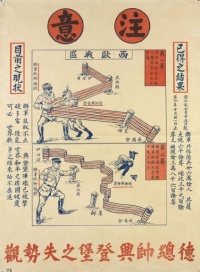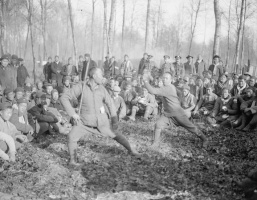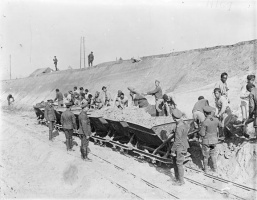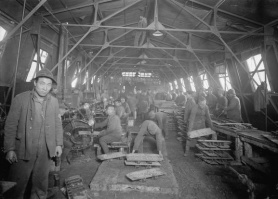“Laborers as Soldiers”↑
As discussed in the essay on China, sending workers to Europe was an important part of China’s plan in joining the war and at post-war peace conferences. The idea of sending laborers to help the Allies was the brainchild of Liang Shiyi (1869-1933) who called it the yigong daibing (literally "laborers in the place of soldiers") strategy. The Chinese decision to send laborers to Europe was unprecedented. Both the Ming and Qing Dynasties discouraged Chinese people from going abroad and even persecuted those who had. The Qing issued decrees to ban emigration in 1717 and 1729 and these decrees were not repealed until 1893. The republican government’s plan to send laborers in place of soldiers in 1915, therefore, should be seen as further evidence of China’s new thinking, the transformation of Chinese society in general and China’s eagerness to join the war in particular. Liang Shiyi began discussing his labor idea with the Allied diplomats in 1915. It is important to note here that Liang’s original suggestion to Britain was the use of military laborers, namely laborers who carried guns, not hired workers. If Britain had accepted this proposal, China would have been fighting on the Allied side in 1915. But Britain turned Liang down in 1915 and was not interested in having Chinese help.
When similar but revised proposals (“laborers” without the adjective “military”) were made by Liang to the French, they immediately attracted French attention. The acquisition of new human resources had become a decisive factor for victory for France in the summer of 1915. Liang’s proposal coincided with the French search for new human resources. France soon started to work with the Chinese and recruit Chinese workers. Although Britain refused to consider Liang’s proposal in 1915, it soon changed its mind in summer 1916 when the British were experiencing an acute manpower shortage. Britain was compelled to seek Chinese help in August 1916 with a plan to use Chinese workers on the Western Front (but not on Britain’s home front due to strong opposition from domestic labor unions). Beginning in August 1916, Great Britain put its own recruitment plan into action.
China was a neutral state until 1917 and the Chinese were technically hired laborers recruited on the basis of written contracts. Chinese laborers for both France and Britain fell into two categories: common laborers (travailleurs) and skilled workers (spécialistes) who could handle difficult jobs and received more compensation. The general contract with France was for five years while the British contract was for three years. In theory, Chinese laborers in France were legally equal to their French counterparts. They could celebrate both French and Chinese holidays with some benefits and were paid about five francs per day. Under British terms, the Chinese had to work ten hours a day, seven days a week and for this were paid one franc per day while their families in China received ten Mexican dollars per month. The laborers would be transported, fed, clothed and housed at no cost.
Between 1916 and 1918, France recruited about 40,000 Chinese workers while about 100,000 Chinese arrived in France to work for British war authorities. It is worth pointing out as well that when the United States entered the war, the American Expeditionary Force arranged to borrow about 10,000 Chinese laborers from the French, employing them on the same terms.
The Men, the Journey, and the Work↑
Most of these 140,000 Chinese workers on the Western Front came from Shandong Province. With the French and British military authorities doing the recruiting, Chinese workers came primarily under military management and were usually organized into military-type units commanded by officers. If they broke rules, they could be court martialed and, in fact, at least ten Chinese laborers under British control were executed under military law during the war. Even their mail service was under military control. Although the Chinese were promised that they would not work under fire, the Chinese often worked in or close to the military zones, especially those working for the British. However, at least before China officially joined the war, most Chinese laborers employed by the French worked away from the front for military industries under French military control. After China officially joined the war in 1917, even French authorities started to assign Chinese workers to military zones more frequently and openly.
Despite their broad similarity of purpose, there were a few differences between France and Britain in their Chinese labor programs. One big difference was their method of recruitment. While France mainly recruited through Chinese contractors, British war authorities used their own agents to recruit Chinese. Secondly, Chinese workers under France received better treatment than those under Britain. For example, France paid the Chinese higher wages and French rules governing the Chinese laborers were less strict. In general, Chinese labor corps were worse off under British control. Racism towards Chinese workers was widespread, especially in Britain where they were locked up in wired camps after work. As mentioned earlier, instead of recruiting its own Chinese workers, the American Expeditionary Forces in France ended up borrowing nearly 10,000 Chinese laborers from the French. Chinese laborers were not happy to work for the Americans overseas due to American racist attitude towards the Chinese. Between 1882 and 1943, Chinese in America were legally discriminated against and the Americans adopted the same attitude toward Chinese in France. Besides racism, cultural misunderstanding and ignorance on both sides – made worse by the serious shortage of interpreters – also explains many management problems.
Despite the racism, mistreatment and cultural misunderstanding, Chinese workers made important contributions of manpower to the Allies’ war effort. The First World War was total war which involved the home front, military and the battlefront. The Chinese who went to France were young and strong, having passed strict medical examinations. While in Europe, they worked at least ten hours per day, seven days a week, with few days off. One can argue that the huge number of Chinese laborers on the Western Front was equivalent to the same number of soldiers although they did not receive the same treatment or respect. In essence, Chinese laborers helped keep the Allies fighting.
Chinese workers in France won high marks for their performance. By the end of the war, and for some considerable time thereafter, virtually all the cranes in Calais, Dieppe, Havre, Rouen and Zeneghem were operated by Chinese crane drivers. The French were quite pleased with the recruited Chinese laborers. General Ferdinand Foch (1851-1929) called Chinese laborers “first-class workers who could be made into excellent soldiers, capable of exemplary bearing under modern artillery fire.”[1] Chinese workers under British control earned a good reputation as well. One report by H. R. Wakefield stated that the Chinese laborer was:
The report concluded by saying that although
Because of the positive perception of their adaptability and intelligence, Chinese laborers in general were more welcome than workers from other countries such as India and Egypt.
Chinese labor corps usually worked in or near the battlefields and many died on European soil for the Allied cause. They not only died in bombardments and some of the workers even had to fight Germans in close combat when emergencies arose. After the war, they continued to sustain casualties as they cleared the battlefields because such work involved locating mines and unexploded bombs. As late as October 1919, 50,000 Chinese laborers remained in British camps although they were being evacuated at a rate of 15,000 per month. Nearly 2,000 Chinese laborers were buried in France alone. Some Chinese even lost their lives before their arrival in France. More than 700 Chinese died on the sea en route to France due to German submarine attacks. In other words, about 3,000 Chinese sacrificed their lives for the Allied war effort.
Chinese sacrifices were not meaningfully recognized, especially after the war as Allied countries tried to get rid of the Chinese workers quickly, claiming that the Chinese disturbed “local stability.” At the Paris Peace Conference, British secretary for foreign affairs Arthur James Balfour (1848-1930) claimed that China’s contribution during the war had involved neither “the expenditure of a single shilling nor the loss of a single life,” completely discounting the sacrifice made by Chinese laborers. Some westerners even suggested that China actually harmed the Allies because its laborers had brought the deadly “Spanish flu” that swept through Europe and the world in 1918. The British government began the repatriation of Chinese laborers in the fall of 1919 and completed it on 6 April 1920. The French repatriation program ended in March 1922. At the end of the war, about 3,000 Chinese laborers remained and eventually settled down in France, including 1,850 qualified men who signed new contracts to work in the metallurgical industries. Other workers found employment in the mechanical or aeronautical sectors. Many of those who remained married French women. Two even lived long enough to receive the French Legion of Honor in 1989.
Significance of the Chinese Workers on the Western Front in Chinese and World History↑
The extraordinary story of the Chinese on the Western Front was significant in both Chinese and world history. Most Chinese laborers came to France and returned home through Canada. More than 10,000 Chinese laborers worked for American expeditionary forces in Europe when the United States joined the war. Therefore, the story of Chinese laborers in France is part of a much larger story of world history, involving Chinese, Americans, Canadians, French and British national and transnational histories. Working, if not fighting, side by side with the Allies, China determinedly signaled its desire and ability to play a role in world affairs and this signal was recognized, if reluctantly, by the rest of the world. It was also the first time such a large number of ordinary Chinese had personal contact with the West. Without a doubt, this experience provided an opportunity for them to observe and experience life in another civilization and to reflect on Chinese society. When they returned home, they brought with them new ideas and a desire for change. We may argue that these laborers who came to the rescue of the Allies were more than hired workers: they were the first wave of new Chinese participation in world affairs and the vanguard of its new national identity.
The link between sending Chinese laborers abroad and the formation of a new national identity must be understood in terms of Chinese social elites’ involvement in the plan. Many Chinese elites were active advocates of and a moving force behind the migration scheme. They thought it would be an unusual opportunity for poor Chinese people to acquire new knowledge and broaden their horizons. They also hoped that when these laborers returned home they would become an important partner in China’s renewal. Li Shizeng (1881-1973), Cai Yuanpei (1868-1940), Yan Yangchu (James Yen, 1893-1990), and Wang Jingwei (1883-1944), among others, were representative of these elites. They advised the government to put in place a standard policy for dealing with the foreign recruitment of Chinese laborers and emphasized the importance of laborers’ education on foreign soil.
To better understand the role of the Chinese laborers in advancing China’s larger national goals, it might help to look at the background of the idea of sending Chinese laborers abroad from the perspective of the elites. Li Shizeng for one had been obsessed with the idea since the turn of the 20th century. Li was an influential intellectual, entrepreneur and politician, who had himself studied in France and translated many French books into Chinese. An advocate of reform, he was interested in bringing the Chinese into personal contact with the West and thus encouraged them to study and work abroad. As early as 1902, when he went to France for the first time, he and Wu Zhihui (1865-1953) had discussed the possibility of sending ordinary Chinese to Europe. For him, the key to reforming China was education and learning from Western countries. Sending Chinese students to the West as laborers would be a perfect vehicle for gaining that experience. Wu Zhihui described Li’s strategy this way: if thousands of young Chinese workers traveled to France, they would make an enormous impact on Chinese society upon their return. Based on this understanding, Li Shizeng, Wu Zhihui, Wang Jingwei, and Cai Yuanpei organized the Society for Frugal Study in France (Liu-Fa jianxuhui) in 1912. The major purpose of the society was to expand educational opportunities, to introduce the Chinese to world civilization and advanced learning and to develop the Chinese national economy. Although the Society shortly dissolved under political pressure from Yuan Shikai (1859-1916), leaders of the group such as Li, Cai, Wang and Wu Yuzhang (1878-1966) never gave up on their vision. When the Chinese adopted the strategy of using workers as soldiers in 1915, Li, Cai and others not only advocated for the idea of working abroad, they also used their influence and prestige to push the Chinese government to better organize and systematize the migration program. They provided assistance to Chinese workers in France. For instance, Li Shizeng had founded The Chinese Labor Journal (Hua gong zazhi) in Paris in 1917 to provide vital information for Chinese laborers.
Moreover, the Young Men’s Christian Association (YMCA) also took a leading role in providing educational, social and entertainment programs for the Chinese workers on the Western Front. A major motivation of the YMCA was to help shape China’s new sense of place in world affairs. Another important aspect of the YMCA’s program was to give future Chinese elites who worked through the YMCA experience with the Chinese workers. Shi Yixuan, a student at Harvard, was the first Chinese student to come to France to work with the laborers in October 1917. Many others such as Yan Yangchu and Jiang Tingfu (1895-1965) soon joined him. They came to Europe because these Western-educated Chinese had fallen under the spell of Woodrow Wilson’s (1856-1924) call for a new world order and promise of a better world system from which China could benefit. They wanted to use their knowledge, energy and experience to help bring about the early inception of this new world order. Yan, a recent graduate of Yale University, came to France in the summer of 1918. He read, translated and summarized foreign newspapers for the workers and taught them in popular literacy classes. He even edited a paper for all Chinese in France, Huagong zhoubao ( The Chinese Laborers Weekly). Through his work with the Chinese labor corps in France, Yan found a way to confront China’s problems and identity crisis. On a personal level, he found his career for life: mass education. He believed that only through education at the village level and reform from the bottom up would China have a chance of renewing itself and qualifying as an equal member of the world community.
With help from elites and direct experience working in the West, Chinese workers learned and developed new understandings of themselves and country, and even about the world. The idea of China as a nation was quite abstract but was now directly relevant to them. The Chinese laborers saw what a Western country looked like and how people in other countries worked and lived. They obviously shared their fellow countrymen’s sense of national identity crisis and wanted to do their bit. They discovered a strong bond with their homeland and became patriotic while in France. One laborer, Fu Shengsan, explained the changes well in an article entitled “Chinese Laborers in France and Their Contribution to the Motherland” (Hua gong zai fa yu zhou guo de sun yi) that appeared in The Chinese Laborers Weekly. He wrote that Chinese laborers did not really understand the relationship between an individual and a nation or between a family and a nation before they came to Europe. When they witnessed the Europeans fighting for their country in the Great War, their own nationalism and patriotism was aroused as well. The same article also declared that the laborers were determined to educate their fellow Chinese with the new knowledge they acquired in Europe. Fu even wrote that the laborers’ experience in Europe helped them realize that Westerners were not superior to the Chinese and that China might become as strong as the West. It is also true that the idea of China as a nation had once been quite abstract to the laboring poor, but overseas it became directly relevant to them. When they found out a damaging flood had struck North China, many workers immediately donated their hard-earned francs to relief efforts. The workers’ new nationalism and patriotism found further expression when they returned to China after the war, with some of them coming back from France via the Pacific. They refused to leave ship when their vessels called at Japanese ports, claiming that Japan “had behaved unfairly to China; being Chinese, they could not land and enjoy themselves.”[3]
The workers’ new nationalism and patriotism found further expression when they returned to China after the war. Chow Tse-tsung, in his authoritative study of the May Fourth Movement, points out that the experiences of these workers helped shape the organization and activities of labor unions in Shanghai during the May Fourth period. They were instrumental in driving the May Fourth Movement to socialist and nationalist extremes in the early twenties. Although most of the Chinese laborers were illiterate farmers with no clear ideas about China or the world when they were selected to go to Europe, they had a part in developing a new national identity and would play an important role in internationalizing society at home. Interactions between the Chinese laborers and young Chinese elites had an immense impact on their self-perceptions and views of each other. Little has been related about how an internationally prominent mass education movement was influenced and later transformed by Yan Yangchu’s work with his countrymen in France. It is well known that future communist leaders such as Deng Xiaoping (1904-1997) and Zhou Enlai (1898-1976) went to Europe after the war to see the center of the Western civilization. Following in the footsteps of the laborers also surely framed the development of their thinking and political commitment.
Conclusion↑
Chinese laborers in Europe not only provided a valuable contribution to the Allied cause, but more importantly, they served Chinese national interests well, playing their critical role in China’s early efforts to step back onto the world stage. South Africans, Indians, Vietnamese and many other laborers went to France during the war to support the British and French. Many went because they came from colonial countries and had to answer the call from their imperial masters. But China, no country’s colony, sent by far the largest number of men and its laborers worked in Europe the longest. The Chinese came voluntarily and their contributions were significant. Even though they were frequently derided by Westerners as “coolies”, “Chinks” or “Chinamen”, these Chinese laborers not only supplied crucial manpower to the Allied war effort but also served as messengers between Chinese and Western civilizations.
Guoqi Xu, University of Hong Kong
Reviewed by external referees on behalf of the General Editors
Notes
Selected Bibliography
- Chen, Da: Chinese migrations, with special reference to labor conditions, Taipei 1967: Ch'eng-wen Publishing Company.
- Chen, Sanjing: Lü Ou jiao yu yun dong (Education movement for Chinese in Europe), Taipei 2013: Zhongyang yanjiuyuan jindaishi yanjiusuo.
- Chen, Sanjing: Huagong yu Ouzhan (Chinese laborers and the European war), Taipei 1986: Zhongyang yanjiuyuan jindaishi yanjiusuo.
- Chen, Sanjing / Lu, Fang-Shang: Ouzhan Huagong shiliao, 1912-1921 (Archival sources regarding Chinese laborers during the European war), Taipei 1997: Zhongyang yanjiuyuan jindaishi yanjiusuo.
- Hayford, Charles Wishart: To the people. James Yen and village China, New York 1990: Columbia University Press.
- Summerskill, Michael Brynmôr: China on the Western Front. Britain's Chinese work force in the First World War, London 1982: Michael Summerskill.
- Tyau, Min-chʻien T. Z.: China awakened, New York 1922: Macmillan.
- Xu, Guoqi: Strangers on the Western Front. Chinese workers in the Great War, Cambridge 2011: Harvard University Press.
- Xu, Guoqi: China and the Great War. China's pursuit of a new national identity and internationalization, Cambridge 2005: Cambridge University Press.












